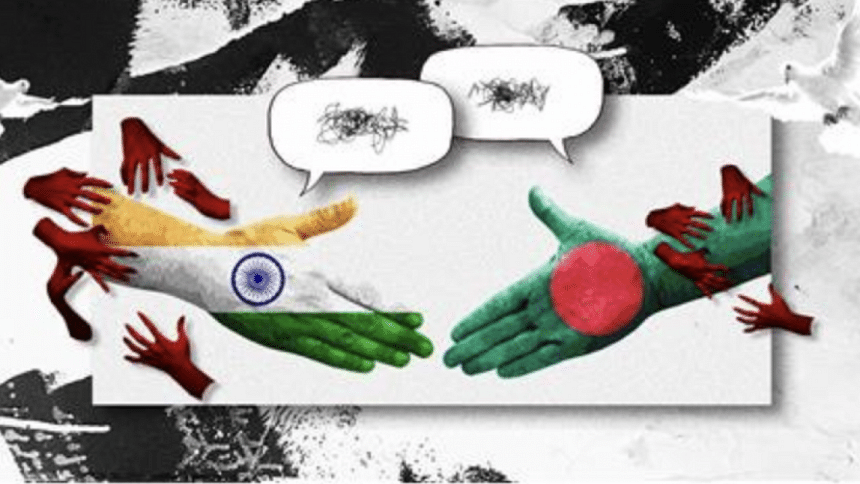Bangladesh-India relations must be based on justice and equal dignity

The relationship between Bangladesh and India is a matter of profound significance and multifaceted complexity, deeply rooted in the historical, geographical, and cultural connections. Historically, this relationship has traversed numerous ups and downs. While there are many instances of friendship, cooperation and mutual support, incidents of suspicion and distrust have disrupted this bond. Recent political changes in Bangladesh due to a student-led mass uprising and the regional and international reactions associated with them have escalated these feelings of doubt and mistrust. Differing messages and perspectives within the realms of politics, diplomacy and the media are affecting the balance of relations between the two countries. As a result, establishing a sustainable, trust-based relationship based on justice and equality has become a significant challenge.
Addressing these challenges requires careful and proactive engagement from both countries. Resolving issues through cooperation, a visionary policy, sincere efforts, and a balanced perspective are essential.
Bangladesh-India relation is not confined to the political realm; it holds immense significance in economic, social, cultural, and geographical aspects as well. In this context, it is crucial for both the Indian government and its major political parties to assess Bangladesh's current political changes with an impartial and pragmatic perspective, and accept the realities associated with the 2024 July uprising. And their priority should be to cultivate a multidimensional, deep and inclusive relationship with the people of Bangladesh.
Regrettably, recent instances of anti-Bangladesh propaganda in certain Indian media outlets, open support for the ousted government, and dissemination of exaggerated news and misleading information have created barriers to impartial and objective analysis. As a result, the relationship between the two countries has become increasingly strained. The recent attack on the Bangladesh Assistant High Commission in Tripura has further exacerbated this situation. It is a condemnable incident that has damaged the diplomatic ties between the two countries. The Indian government must take swift and effective measures to prevent such occurrences in the future.
On the other hand, Bangladesh should focus on establishing a relationship with India based on justice and mutual respect. In this regard, it is essential to jointly explore solutions to long-standing unresolved issues, such as equitable sharing of river waters, stopping border killings, facilitating mutual trade and investment, and improving cross-border communication.
It is also vital for the Bangladesh government and political parties to avoid creating a space for anti-India rhetoric in discussions or protests. Adopting a responsible and mature approach in dealings with India is essential for safeguarding Bangladesh's long-term interests. Cheap anti-India sentiment may serve the immediate interests of certain political groups, but it is never conducive to the well-being of the Bangladeshi people.
Concerns about the rights of religious minorities in Bangladesh and India are a tangible and deeply rooted issue, embedded within the social and political structures of both countries. In both nations, minority communities have, at various times, faced discrimination, persecution, and the shrinking of their rights. Addressing such discrimination through state action and well-planned policy formulation is crucial. However, this issue often becomes the focal point of political debates, complicating the path to a genuine solution and preventing the core of the problem from being addressed.
The primary demand of minority communities in both countries is equal rights, security, and a life of dignity. They do not wish to be used as tools for any political group's interests. Keeping this reality in mind, especially in the context of Bangladesh's recent political changes, ensuring the security of minorities should be a key focus of the interim government.
In this regard, it is essential to remain vigilant both within Bangladesh and beyond, against any group whose activities may disturb communal harmony. Such groups not only jeopardise internal stability but also have a negative impact on international relations. For example, an increase in communal tensions within Bangladesh could have repercussions in India, and similarly, the internal dynamics of India can affect the situation in Bangladesh.
It is a reality that narrow-minded, communal groups in both countries provoke intolerance and division. They not only create problems within their own nations but also influence each other. In this context, both governments have a responsibility to strictly control the activities of these groups and take effective steps to counter their influence.
Maintaining communal harmony is not solely the government's responsibility. Civil society, the media and religious leaders also play a crucial role in this process. It is necessary to create a humane, tolerant, and dignified environment where everyone can live safely in their own identity. Such a tolerant and inclusive environment is not only vital for minorities but also for the overall social stability and development of both countries. Bangladesh and India have a historic opportunity to set an example through cooperation, contributing to a future built on religious tolerance and respect for human rights.
Building a multidimensional and balanced relationship between Bangladesh and India based on justice and equal dignity is an imperative of our time. In the context of the deep interconnections of geography, history, culture and economics, making this relationship more sustainable and dynamic will ensure the socioeconomic welfare of the people of both countries. This is not only necessary but also essential for the overall development of both nations and regional stability.
In recent times, especially following the July uprising in Bangladesh, this has posed a significant challenge for the political parties, civil society and media in both countries. It has highlighted the need to reassess outdated strategies, narrow perspectives and one-sided decision-making processes. At the same time, it has created an opportunity to open the door to a new and positive bilateral relationship. Now is the time to seize this opportunity and take effective action. In bilateral discussions, both parties should jointly seek solutions to unresolved issues based on justice and mutual respect. If this opportunity is not seized in time, narrow-minded communal groups will try to exploit this gap and further complicate the situation.
Therefore, Bangladesh and India should take a collective initiative to begin a new chapter in the bilateral relationship. It is not only the responsibility of political leadership but also of civil society, academics and the media to create a positive environment. This will not only help build trust between the two countries but also set an example of peaceful and cooperative relations for the larger South Asian region. This way, current challenges will be addressed and the way for a brighter future for the people of both countries will also be paved.
Dr Selim Raihan is professor in the Department of Economics at the University of Dhaka and executive director of South Asian Network on Economic Modeling (SANEM). He can be reached at [email protected].
Views expressed in this article are the author's own.
Follow The Daily Star Opinion on Facebook for the latest opinions, commentaries and analyses by experts and professionals. To contribute your article or letter to The Daily Star Opinion, see our guidelines for submission.


 For all latest news, follow The Daily Star's Google News channel.
For all latest news, follow The Daily Star's Google News channel. 









Comments